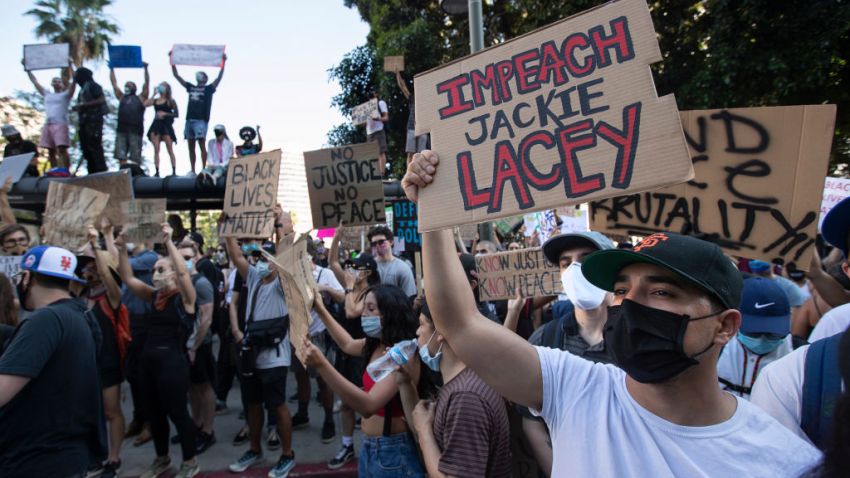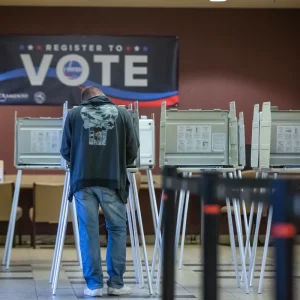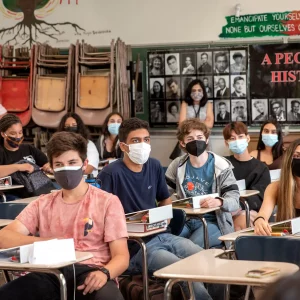The police have killed 861 people in 2020. Black Americans, despite accounting for 13 percent of the United States’ population, represent 28 percent of those killed by law enforcement.
Eric Garner. Tamir Rice. Rayshard Brooks. Elijah McClain. Breonna Taylor. George Floyd.
There are countless others, whose names we saw plastered in the news and on social media. And even more, whose names didn’t make headlines. These tragedies are intensely far-reaching, and the heartbreak is palpable across the nation. This is not what true justice looks like, and people are demanding answers. From a lack of education reform and preventative initiatives, to high recidivism rates and overcrowded prisons, the entire system is revealing itself to be deeply flawed from top to bottom. Those who demand justice are not just looking at police officers, they are looking critically at every facet of the carceral state, exposing the inequities rooted at its very core.
In Los Angeles, this has materialized in a way that will hopefully send a message to voters across America. People are finally paying attention, on a large scale, to one very important elected position that too often slips through the cracks: the District Attorney.
As the leader of the largest prosecutorial body in the nation, the Los Angeles’ District Attorney carries immense power that is not often fully understood by the general public. Jackie Lacey, the current District Attorney, was elected in 2012 and is the first woman and Black American to occupy the position. She grew up in South LA and is a democrat that supported progressive policies many had hoped would reframe justice in their community. Melina Abdullah, co-founder of the Black Lives Matter movement said that in 2012, Lacey retained support from many in the Black community who were excited to see the decision-making power go to someone who looked like them.
While running in 2012, Lacey outlined reform initiatives for Los Angeles County. Her platform included expanding the county’s alternative sentencing programs with a focus on rehabilitation for veterans and those affected by mental illness and substance abuse. She also supported increasing prosecutions for environmental crimes and expanding prevention programs.
Handling crime in Los Angeles was personal for Jackie Lacey. Growing up in South LA, she recounted walking to school in an area riddled with gang violence. Shortly after becoming a DA, her father was shot in the Crenshaw district. Though he survived, he suffered severe injuries and lasting trauma.
“That changed our family,” Lacey said in an interview with the Los Angeles Times. “If you’ve ever been the victim of any violent crime like that, it does have an impact on you. You start to be fearful in places you shouldn’t be fearful.”
Still, being a Black woman growing up in an area where “crime and inequality were an everyday fact of life” forced her to consider racial schisms within the justice system. “I’ve seen so many black people cheated by tradesmen or intimidated by the police,” Lacey said. “I’d like to help change that.”
Fast forward to 2020, and Black Lives Matter wants Jackie Lacey out. Throughout the last eight years, the relationship between BLM and Lacey has become fraught beyond repair. On March 2, 2020—the day before the California primary election that could decide if Lacey would remain in office—BLM chose to protest outside of Lacey’s home. When the protest began to encroach on her property, Lacey’s husband was seen on camera pulling a gun on Black Lives Matter protestors.
Black men are often vilified and criminalized in the media. Images of David Lacey, a Black man holding a gun at protesters, began circulating in the news— something that only begins to capture the complexities of Lacey’s relationship with BLM. Their conflict was characterized by eight long years of back and forth hostility, with harassment allegations coming from both sides. At the time, this felt like a climactic moment: the peak of a years long conflict, now plummeting towards a bitter end. But when the primaries came the following day and no candidate won a majority, the race was set for a runoff on November 3, 2020. Since that day, the conversation surrounding criminal justice has drastically shifted; that moment in March was truly only the beginning.
After she initially took office, Lacey began seeing pushback from the Black community. Crime was dropping, but many were concerned about the impact of her choices on people of color being that 80 percent of prisoners in county jail are Black and Brown. Moreover, consistent with California law, Lacey has pursued the death penalty in some special circumstance cases, inviting criticism from groups that oppose capital punishment.
Most notably in today’s conversation is that Jackie Lacey has failed to prosecute law enforcement officers involved in controversial, on-duty shootings. BLM has focused their energy on this tremendous oversight of the DA’s office, particularly when these shootings resulted in the death of unarmed Black men and women. Despite rising concerns from the public, she has declined to meet with BLM on multiple occasions throughout the last eight years, despite their many requests to do so.
Nationally, there have been many attempts to sweep officer-involved shootings under the rug. Even when they do gain media attention, it often feels like justice is seldom served in a way that adequately responds to the magnitude of the tragedy. Cases involving the prosecution of peace officers are handled by an area of the DA’s office known as the Justice System Integrity Division. Many advocacy groups attribute the lack of prosecution to personal relationships between district attorneys, their office, and police officers. It is worth noting that, due to the nature of the job, district attorneys have to work alongside police officers in many instances. While this does not necessarily imply bias, the impartiality of the District Attorney’s office in the handling of these delicate situations is debatable.
Notwithstanding any potential bias by the DA’s office, it is also true that these cases are among the most difficult to prosecute, as the law is heavily in favor of the officer. The law protects police officers who have fired their weapon when they are in fear for their lives or for the lives of others, regardless of whether or not their fears were rooted in reality. But even if these cases are difficult to win, does that justify not taking action?
On May 5, 2015, Brandon Glenn was shot and killed by Officer Clifford Proctor. Glenn was Black and unarmed. The shooting was captured by a security camera, and given the nature of the incident, Los Angeles’ police chief at the time, Charlie Beck, made an unprecedented statement: he called for Clifford Proctor’s prosecution. With the statute of limitations being three years, the DA’s office was given that amount of time to make a decision. Almost exactly three years later in March of 2018, Jackie Lacey announced that the DA’s office would not bring charges against Clifford Proctor.
On the night of Brandon Glenn’s death, a bartender called the police because Glenn was being “loud and obnoxious” and refused to leave the bar. When the police arrived, Glenn approached Officers Proctor and Kawahara with a large dog. Proctor is depicted on Kawahara’s body camera footage using expletives and telling Glenn to back off. “Don’t come over here with your dog or I will shoot your dog,” Proctor threatened. When Glenn eventually backed off, the three men walked outside and their following altercation was captured by security cameras. When it appeared that Glenn began resisting arrest, Proctor pulled out his gun and fatally shot Brandon Glenn.
Proctor claimed Glenn was reaching for Kawahara’s gun. From the angle of the security camera, it is unclear whether or not this was true. Officer Kawahara, however, says he felt no tugging on his gun belt and does not know why Proctor shot Glenn.
Lacey released an 83 page memo justifying her decision not to prosecute. Despite the body camera footage that depicted an obviously agitated Officer Proctor, Lacey characterized the officer’s demeanor as “calm and professional.” Police Chief Charlie Beck, on the other hand, faulted the officer for “likely escalating the situation.” Many criticized Lacey, arguing that her memo read more like that of a defense attorney’s.
Lacey seemed to have made a prudent calculation that they would not be able to win the case, and therefore chose not to pursue it, as per standard practice in the DA’s office. But considering the complexity of this incident, how do we know where this line actually is? Is there any perfect science to determine the likelihood of a conviction in any given case? The decision making power is largely at the discretion of the DA’s office within a limited interpretation of the law. If Lacey refused to prosecute an officer even at the rare recommendation of the Police Chief, would she ever be willing to? And even if Lacey did make all the right decisions, are civilian defendants given the same degree of consideration and leniency?
This clash between the District Attorney and the Police Chief is highly unusual and may speak to Jackie Lacey’s deeper vested interests. Critics of Lacey have describe her as being highly adherent to police unions. NAACP President Sherrilyn Ifill said, “Understanding how police officers are shielded from accountability for misconduct requires an examination of police union contracts, which often contain provisions that preclude the prompt and thorough investigation of unconstitutional police misconduct.” Collective bargaining agreements with cities allow police unions to wield significant political power.
Elected officials, like Jackie Lacey, often need to secure police endorsements in order to get elected. In the past, this has sometimes resulted in agreements between officials and police unions that set provisions outlining if and how police officers are disciplined for misconduct. For example, Derek Chauvin, the man facing murder charges for the death of George Floyd in Minneapolis, received twenty complaints but only two formal reprimand letters during his career as a police officer. This disparity is suspect, to say the least. The undue influence of police unions in managing the scope of law enforcement is a major hurdle in combating police brutality and abuse of power on a national level.
In many respects, Jackie Lacey is a relatively progressive force and a respected leader within the DA’s office. She is not an ultra-conservative politician seeking punitive punishments in communities of color. She has stated her support for reform initiatives and has said she wants to help those who have fallen victim to the failures of the justice system. It is clear, however, that she will work for progress only insofar as it maintains the status quo.
For decades past we have seen the failures of law enforcement, but not justice. In the last six months, Black and Brown voices have finally been amplified on a nation-wide scale, and they are demanding change. Jackie Lacey has shown she is unwilling to do what it takes to disrupt the current order and make that change. She sees the role of District Attorney as being an efficient prosecutor and views issues through a prism of rules and laws. Over the course of her term, she would not make BLM’s agenda a priority, indicating that she did not see their cause as her responsibility. In doing so, she was behaving like a career prosecutor, not a conscientious politician. The role of elected District Attorney, however, requires her to be both.
Black Lives Matter has been protesting Jackie Lacey nearly since the beginning of her term. Lacey rose to prominence in 2012, just as BLM did. While she may have understood their mission back then, she certainly failed to understand their tremendous organizing power. She continuously refused to meet with the group or outwardly acknowledge their fight. As BLM grew in size and influence, their relationship became increasingly tense. She continuously declined to prosecute officers involved in controversial shootings. In doing so, she failed to recognize the hurt felt within the community. Black Lives Matter has taken notice of this for the past eight years. In the past six months, however, these protests have ramped up, involving more and more people across Los Angeles. The same group that she had not taken seriously in 2012, may now be her undoing.
Pushback against Lacey has given life to her opponent’s campaign to unseat her in November. George Gascón of San Francisco is capitalizing off of Lacey’s criticisms, running as a reformer on a progressive platform. Gascón claims he does not take money from police unions, “enabling him to be independent and prosecute police misconduct without a conflict of interest.” However, Gascón, who has spent most of his career as a police officer, has also been criticized for his failure to prosecute officers.
In December of 2015, Mario Woods was fatally shot by police in San Francisco, but Gascón declined to bring charges against the five officers involved. Colin Kaepernick, whose political movement in the NFL is well known, recently revealed that Mario Wood’s death is what initially compelled him to kneel during the National Anthem. While Gascón may be more progressive, his record as elected DA in San Francisco invites questions similar to those being asked about Jackie Lacey.
More than anything, the lack of a truly progressive choice in the upcoming election offers us an important lesson: we can never turn a blind eye to the system. Black Lives Matter has pressured Lacey since the beginning, never taking their eyes off of her. In 2020, thousands have congregated outside City Hall to protest her failure to act, and it’s not going unnoticed. Lacey is in an extremely vulnerable position for this election, and BLM very well may succeed in their mission to unseat her. Regardless of who wins in November, this is something to learn from. Today more than ever it is imperative that we know who these candidates are, what they believe in, and what power they may wield if elected. Then, we need to hold them accountable.
Too often the true power of the District Attorney is lost on everyday voters. The Los Angeles District Attorney’s Office is the single largest prosecutorial agency in the United States and it plays an integral role in the national narrative of criminal justice. Who determines the future of it will not only be decided upon in November’s runoff between Lacey and Gascón. The future of the DA’s office will ultimately be determined by how much we, the people they vow to serve and protect, choose to engage with it.
Featured Image Source: Los Angeles Times via Getty Images





Comments are closed.